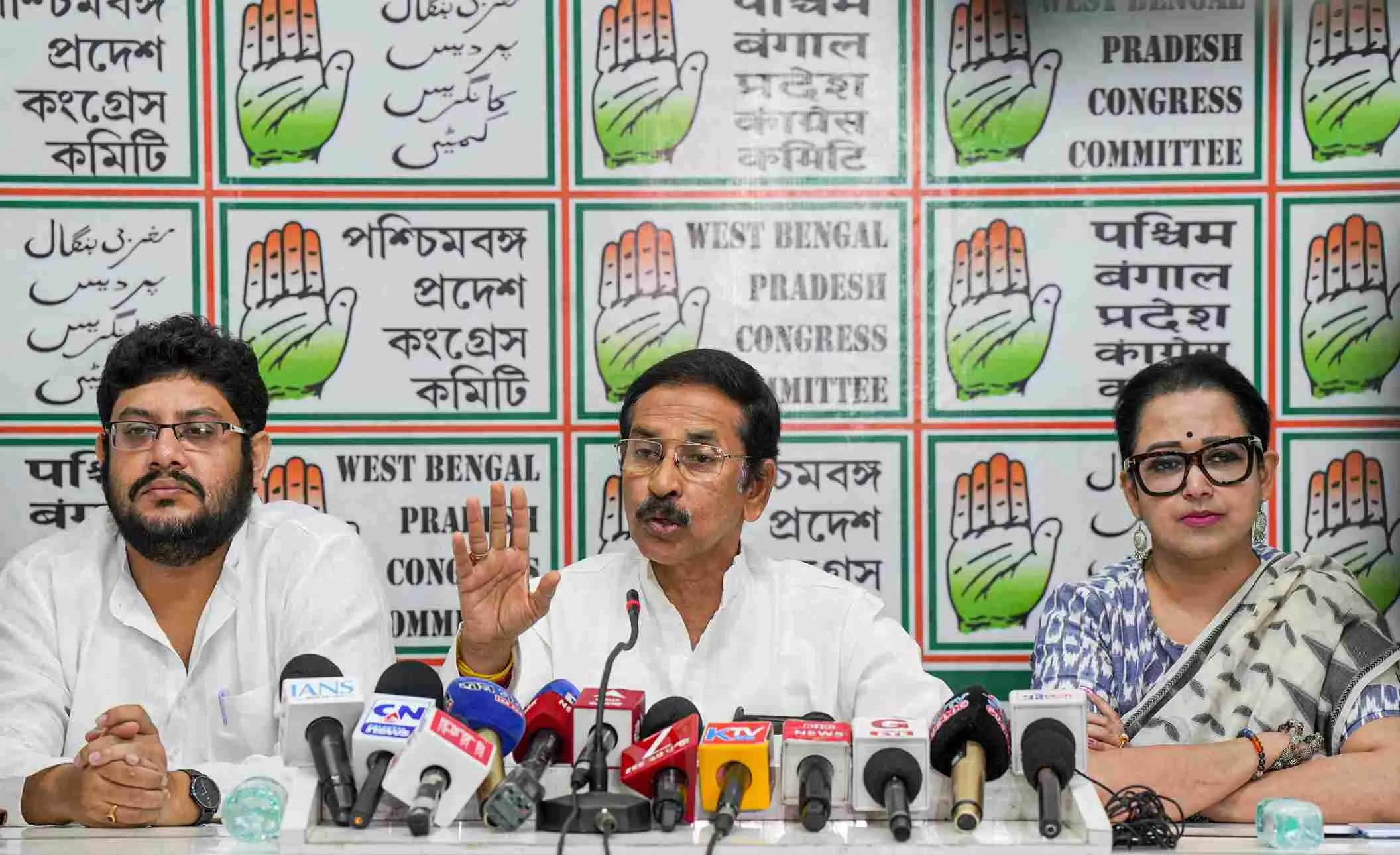
West Bengal Pradesh Congress Committee (WBPCC) President Subhankar Sarkar addrsess a press conference, in Kolkata, Wednesday, Oct. 29, 2025. Photo: PTI
Tribal rights protest sparks potential third-front alliance in Bengal
Convention united Congress, Left, CPI(ML), and civil groups against coal mining project, signalling a possible anti-TMC, anti-BJP coalition before 2026 state polls

The 'Solidarity Convention' convened on Wednesday, October 29, to protest the Deocha-Pachami coal mining project in Birbhum district, has emerged as a catalyst for the potential formation of a broad political alliance excluding both the TMC and BJP, in the lead-up to the West Bengal’s 2026 Assembly elections
Bringing together the CPI(M), Congress, CPI(ML), and nearly 30 other socio-political groups, the convention at the Youth Centre in central Kolkata may have inadvertently laid the ground for a broader political realignment in a state dominated by the TMC-BJP binary since 2019.
Unifying platform
Though the organisers insisted that the focus was “purely on the Deocha-Pachami issue,” several participants hinted at deeper political implications.
“While the convention focussed solely on the Deocha-Pachami project’s adverse impact, the movement could evolve into a unifying platform for all forces opposing both the Trinamool Congress and the BJP,” Congress spokesperson Chandan Ghosh Choudhury told The Federal.
He further stated that the Deocha-Pachami issue would likely become one of the main election planks for the Congress and like-minded parties.
Also read: Bengal Opposition lags behind TMC in booth-level preparedness for SIR
Political analysts echoed this sentiment, suggesting that the issue-based protest could evolve into an electoral mobilisation platform, particularly in the tribal belts where land rights and displacement remain sensitive, and where the Deocha-Pachami project has already sparked local protests.
Reviving old ties: Congress-Left
The Congress-Left Front alliance in the state effectively ended after their joint electoral debacle in the 2024 parliamentary elections.
In the aftermath, leaders from both sides engaged in public criticism. A Forward Bloc leader stated that aligning with the Congress had been a mistake, and the CPI(M)'s Central Committee noted that the alliance did not align with its policies.
In subsequent Assembly by-elections held in October 2024, they fielded separate candidates, signalling the end of their electoral understanding. The Congress and the CPI(M)-led Left Front have now decided to build a joint agitation on the Deocha-Pachami issue, signalling a revival of their old ties.
CPI(ML) joins in
Significantly, parties like the CPI(ML), which had previously stayed away from anti-TMC posturing on the grounds that the BJP should be the principal opponent in Bengal, have joined the anti-Deocha-Pachami movement.
“It was a rare show of unity not only of the Congress and the Left parties, but also among all the Communist parties in the state, as evident from the presence of the CPI(ML) at the convention,” pointed out Amal Sarkar, a chronicler of West Bengal politics for about four decades.
Rooted in Adivasi rights
He added that this unity could be a precursor to a broader anti-TMC and anti-BJP front ahead of the Assembly elections. A cohesive third-front alliance would allow these parties to project themselves as a credible alternative to the TMC and the BJP, rather than a residual protest vote.
Also read: BJP leaders attacked, political tensions flare up in N Bengal amid rain disaster
To intensify the movement, participants resolved to organise statewide protest programmes on November 15, coinciding with the birth anniversary of tribal icon Birsa Munda. The date is symbolic to underline the movement’s roots in Adivasi rights and resistance.
The convention adopted a six-point charter of demands, which includes an immediate halt to basalt quarrying and land acquisition, an end to alleged administrative persecution, and a judicial inquiry into the mine’s allocation process.
It also insisted that no project should proceed without the free and informed consent of affected tribal and local communities.
Criticism of TMC govt
Speakers from across the political spectrum criticised both the TMC government and the Central government, accusing them of collusion in pushing through India’s largest coal-mining project without adequate safeguards for local communities.
CPI(M) state secretary Mohammad Selim charged the government with “covering up large-scale mining as coal extraction,” adding that the state had “misled the Kolkata High Court” on key aspects of the project.
State Congress president Shuvankar Sarkar alleged that “police atrocities are ongoing” and that the chief minister’s pro-industry statements contradicted her government’s actions on the ground.
“What we see in the name of development is brokerage,” he said.
Also read: Ahead of elections, BJP taps football and cinema to boost party prospects
Abhijit Majumdar, state secretary of the CPI(ML) Liberation Front, described the project as part of a wider “land loot” across West Bengal, arguing that “the Deocha-Pachami struggle must be viewed as integral to the movement to protect the environment and natural resources.”
Quoting statements of participating leaders, political commentator Nirmalya Banerjee noted that the Deocha-Pachami issue could be leveraged to challenge both the TMC and the BJP simultaneously.
“These parties have identified it as a credible social issue with wide resonance in tribal and rural areas, one that can be used against the TMC government in the state as well as the BJP regime at the Centre. If this coordination continues, it could potentially evolve into a political bloc by 2026,” he added.
After securing sole development rights for the coal block from the Centre, the TMC government has been pushing to mine the country’s largest coal block, presenting it as a flagship achievement of the Mamata Banerjee administration.

